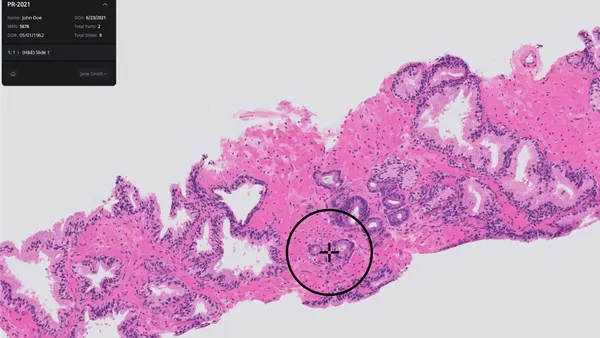Dive Brief:
-
The U.S. Preventive Services Task Force has finalized its updated guidelines on when to test for BRCA mutations associated with increased risk of certain cancers. The statement was published in JAMA on Tuesday.
-
The recommendations by the nonprofit group of experts largely follow the position took in 2013. The notable changes are the addition of women previously treated for breast, ovarian, tubal or peritoneal cancer as those who should be tested.
-
The expanded population will potentially boost business for Myriad Genetics and other BRCA test makers, but the group resisted calls to add any further categories of patients and multigene panels to its guidelines.
Dive Insight:
The task force has recommended genetic testing for women who are more likely to have BRCA1 and BRCA2 mutations based on their family histories since 2005. The latest update reaffirms the core position that the task force adopted 14 years ago while making some changes to expand the pool of people deemed appropriate for testing.
Women with personal histories of breast, ovarian, tubal or peritoneal cancer are now recommended to receive BRCA testing. The advice covers women successfully treated for these cancers in the past. Testing such people for BRCA mutations could reveal if they are at greater risk of developing another cancer in the future.
USPSTF has also added women “who have an ancestry associated with BRCA1/2 gene mutations” to the list of appropriate candidates, a provision that makes a recommendation touched on in the 2013 guidelines more explicit. Back then, USPSTF’s headline recommendations lacked such a statement but the body of the guideline discussed the value of testing Ashkenazi Jewish women on the grounds that BRCA mutations are more prevalent in that population.
The changes widen the pool of patients expected to benefit meaningfully from BRCA testing. Myriad created the market for BRCA tests but in recent years has faced competition from companies including Invitae and, more recently, direct-to-consumer rival 23andMe.
Myriad and rivals such as Invitae see multigene panels, not two-gene BRCA1 and BRCA2 tests, as the future of hereditary cancer risk assessments. USPSTF received feedback on its draft requesting the addition of multigene panels to its list of recommended tests but the task force found little evidence to justify the change.
"The clinical significance of identifying pathogenic variants in multigene panels requires further investigation. The evidence is currently limited on other moderate penetrance genes, given their relatively low incidence in the population," USPSTF wrote in its guidelines.
The task force also resisted calls to expand the BRCA testing patient population to include pancreatic cancer, melanoma, prostate cancer and men with breast cancer. The task force acknowledged evidence of a link between the tumor types and BRCA mutations but opted against expanding its stance.











